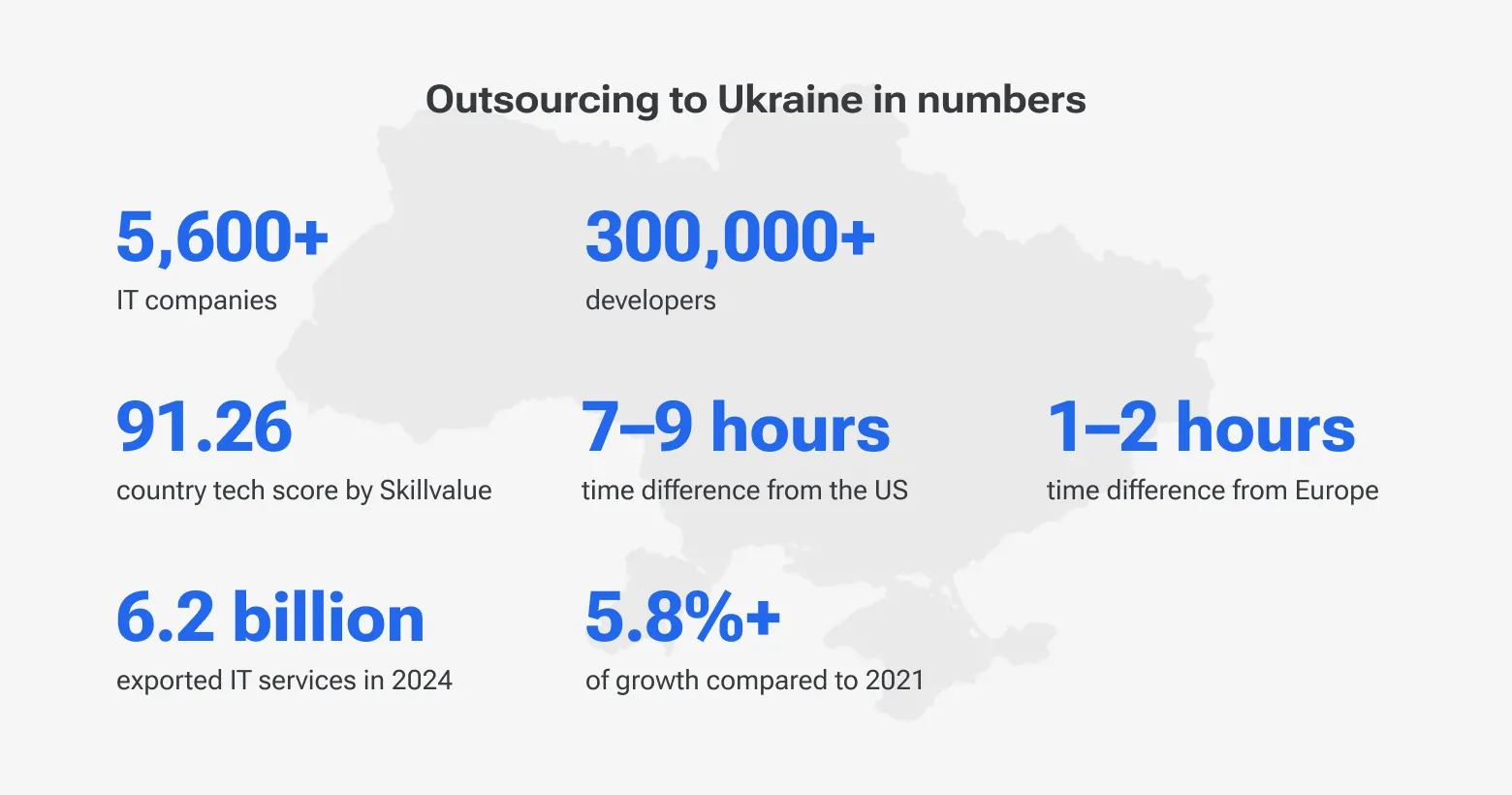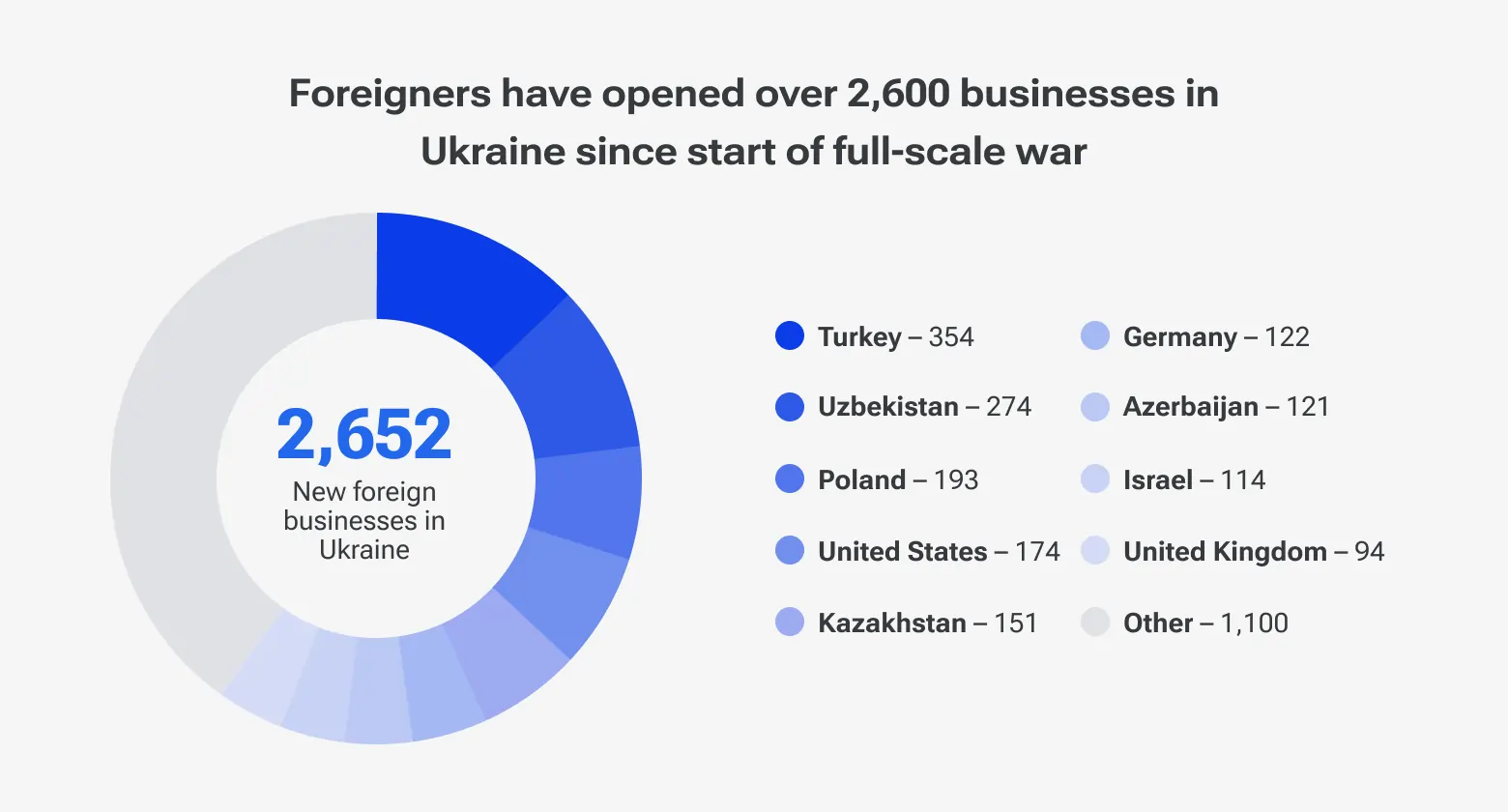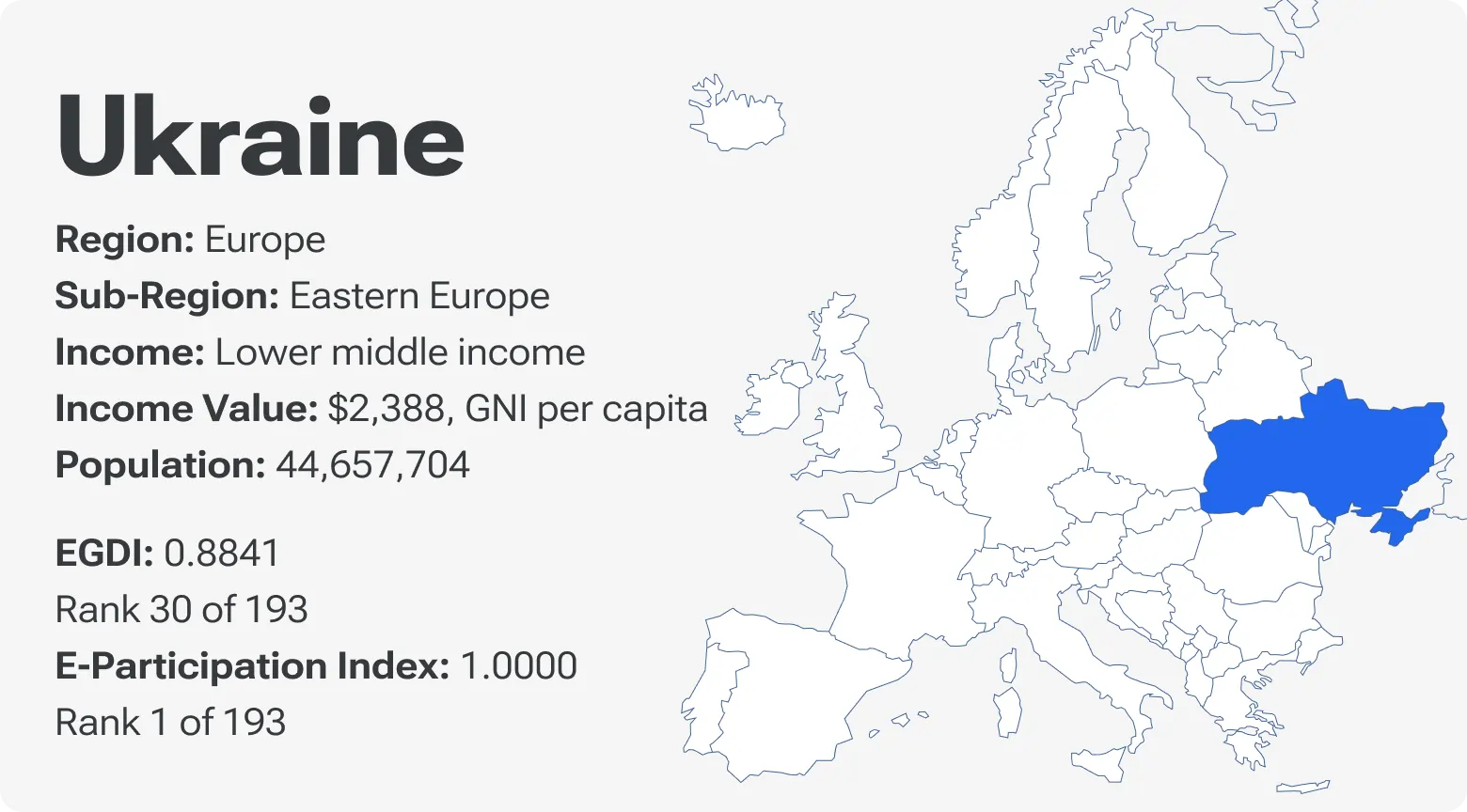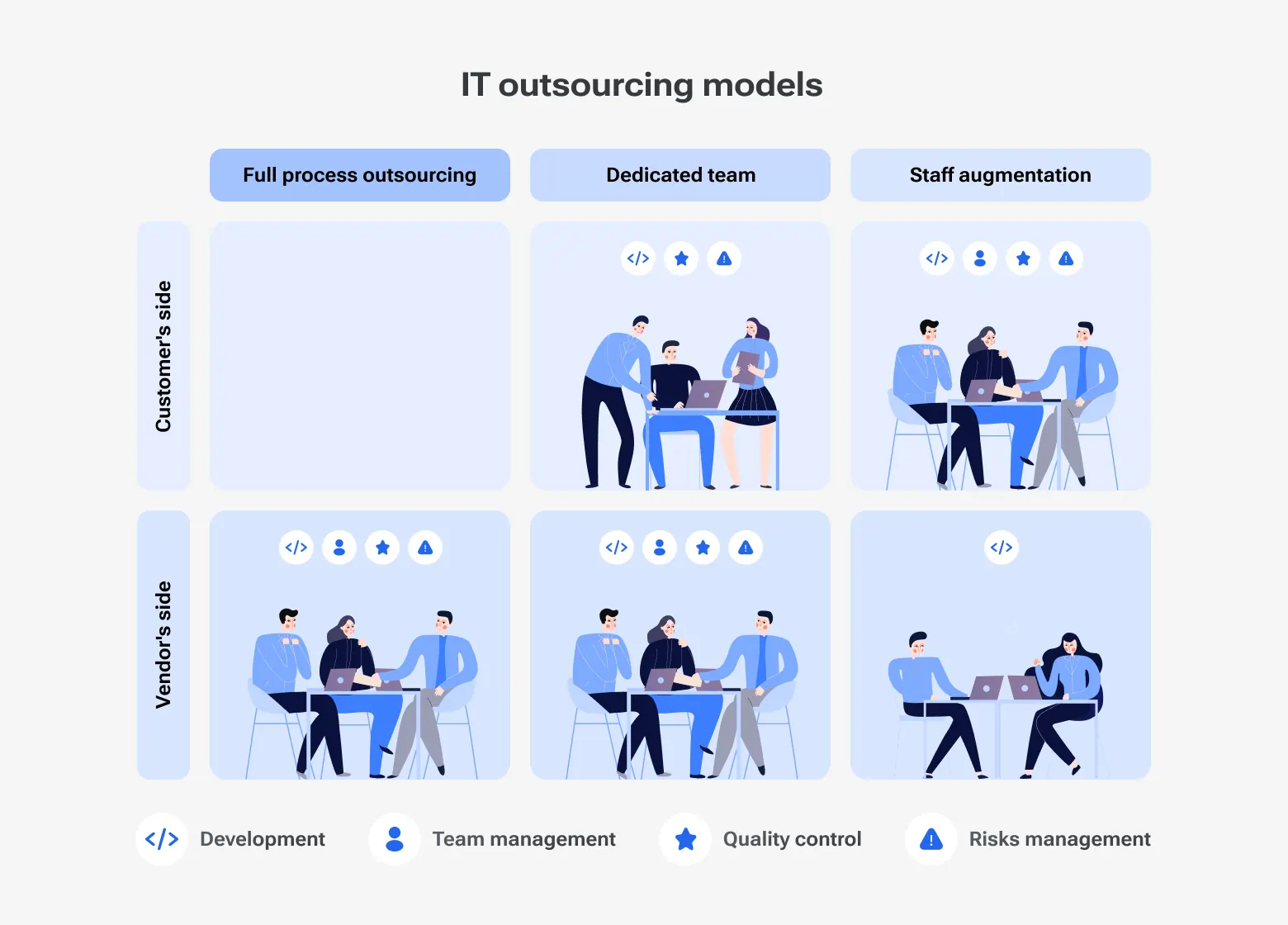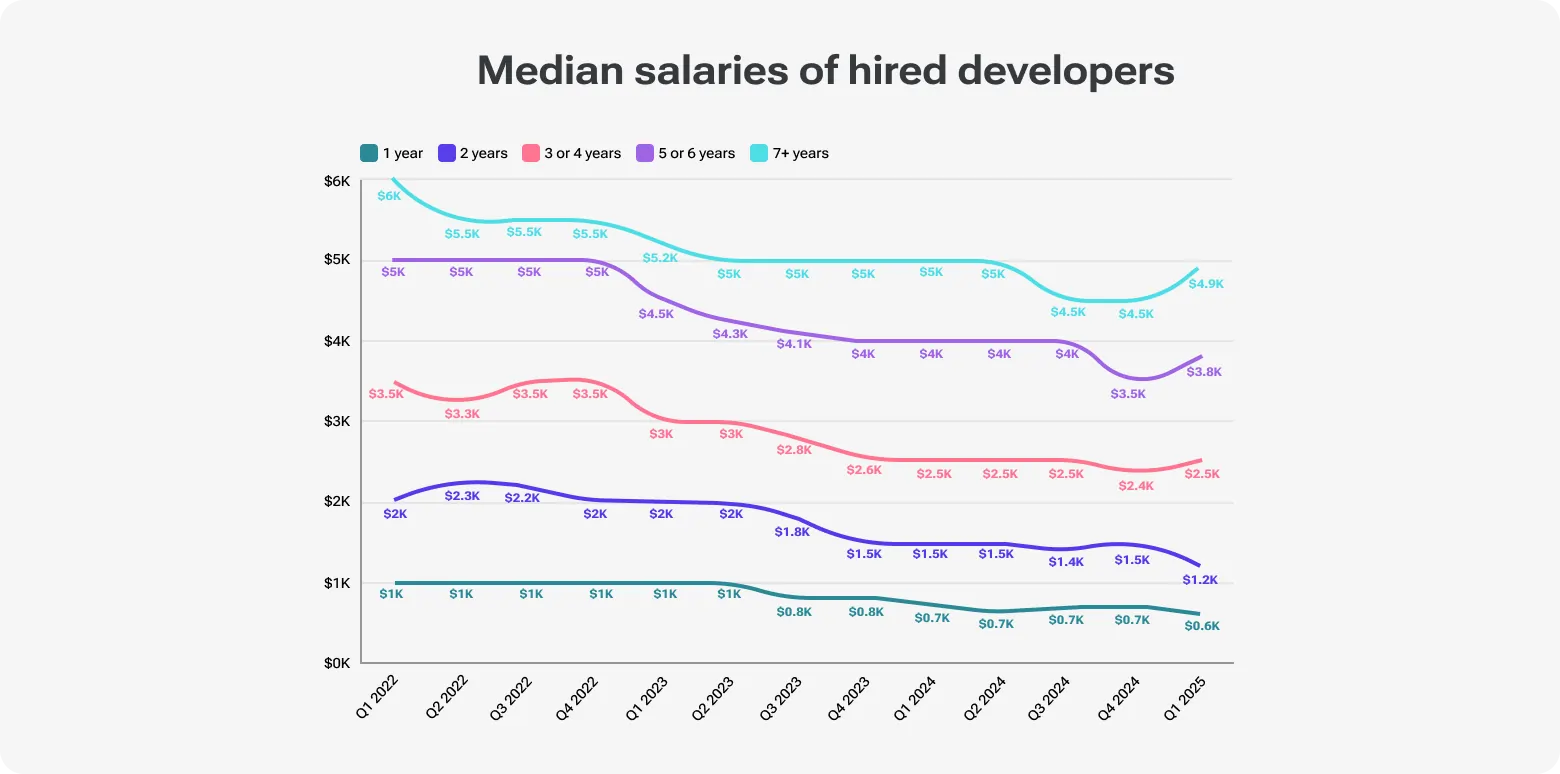Amid a full-scale war, Ukrainian software development companies exported USD 6.2 billion in 2024. The country has been a prime destination for offshoring and nearshoring in recent years.
The industry was impacted by constant shelling and blackouts, but there are still many software developers in Ukraine who prefer to stay in their homeland to help their country.
For this reason, developers rewired their networks to backup grids, worked from bomb shelters, and still delivered code to Fortune 500 clients on time.
That’s precisely why businesses keep turning to Ukraine — 2,600 foreigners opened new companies here after the full-scale invasion.
Considering costs (which are 40-60% lower compared to US service firms), you’ll be getting elite engineering talent trained under pressure, with a Western mindset and English proficiency on par with top European hubs.
This article breaks down:
The actual software engineer salary in Ukraine, by tech stack, experience, and engagement model.
Why it’s a good idea to hire developers in Ukraine compared to Poland, India, and other outsourcing hotspots.
Hidden costs to watch out for — and the subtle savings most buyers overlook.
Flexible staff augmentation and expert software developers in Ukraine
And how Devico helps its foreign clients tap into this market safely and strategically.
Hiring budget: Software developers in Ukraine?
Outsourcing in general is a great way to save money. With remote work now widely adopted, it’s easier than ever to work with top talent regardless of location. Many Ukrainian companies provide full-cycle services, including project management and quality assurance, so there’s no need to hire extra people or spend more than necessary.
Ukraine outsourcing hourly rates by experience level
As of 2025, Ukraine’s devs have the following rates:
Junior (1-2 years experience): USD 7 - USD 10/hr
Mid-level (2-5 years): USD 15 - USD 30/hr
Senior (5+ years): USD 30 - USD 45/hr
Note: Tech stack and location within Ukraine matter; sometimes rates can vary markedly.
Rates by tech stack
JavaScript/Front-end:
Junior: ~USD 7 - USD 10/hr
Mid-level: ~USD 12 - USD 25/hr
Senior: USD 25 - USD 30/hr
Python:
Junior: ~USD 10 - USD 15/hr
Mid-level: ~USD 25 - USD 35/hr
Senior: ~USD 35 - USD 50/hr
C# / .NET:
Mid-level: ~USD 25 - USD 30/hr
Senior: USD 35 - USD 50/hr
DevOps/AI/Data Science (rare skills):
It depends, but on average, you can expect to pay USD 60+/hr to hire a ML engineer (monthly Ukraine’s software developer salary reaching USD 6,000 and beyond).
Full‑time vs outsourcing vs freelance: Cost comparison
Engagement model
Monthly cost
Hourly rate
Note:
Full-time includes benefits, payroll taxes, office and/or infrastructure costs
Outsourcing often includes management, infrastructure, and recruitment overhead
Freelance is most flexible, but varies in reliability and commitment
Cost comparison: Ukraine vs. Poland, India, and other outsourcing hubs
When comparing popular outsourcing destinations, it’s not just about hourly rates — it’s about the value you get for that rate. To understand how different destinations stack up, it helps to look at both total project costs and hourly rates side by side.
Hourly rate comparison
Country and region
Junior rate
Senior rate
Average
Ukraine balances cost and quality
Software development outsourcing to Ukraine is listed among the best practices in the Western world. Moreover, you may already know top Ukrainian devs without even knowing their names.
Sounds like a paradox. However, how many UA developers can you list? But you definitely know such products as Revolut, Reface, Grammarly, and Petcube. Before the russian invasion, Ukrainian tech specialists regularly broke into the top 10 in international coding contests.
Additionally, the country has a 91.26 tech score by Skillvalue and ranks 30th out of 193 in developing e-Government services.
Value comparison: Ukraine vs India
Rates are almost the same: mid-tier Indian developers (USD 35/hr) vs. Ukrainian mid-tier (USD 30 - USD 40/hr).
UA guys excel in quality: Ukrainian developers show higher English proficiency, cultural alignment with Western teams, and stronger familiarity with European business norms.
Time zone matters: Ukraine better overlaps with European work hours.
Risk factor that you want to consider: Ukraine delivers under war‑tested resilience. Many businesses say “deliverables never miss deadlines,” even under blackout constraints. But you should always be in the know of the condition.
Engagement models and cost considerations
Hiring full-time developers
Scheme: Employees hired directly under Ukrainian labor law or via Diia City gig contracts.
Cost: For mid-level roles, monthly compensation ranges from USD 2,000 to 3,500, plus payroll taxes and benefits (health insurance, events).
Pros:
Deep understanding of your business and company culture
Full control over processes and direct supervision
Cons:
Fixed overhead even during downtimes
Recruitment, HR, and compliance expenditures
What are the costs of hiring software developers in Ukraine?
Dedicated teams (outsourcing/outstaffing)
Scheme: A Ukrainian vendor selects the team tailored to your specific needs with relevant skillset and experience. Usually, billed monthly or hourly (USD 30 - 50/hr for mid-level roles).
Pros:
No hiring delays: vendor handles all workforce-related issues
Scaled flexibility: adjust team size as needed
Transparent billing with bundled rates (office, management, infrastructure)
Cons:
Slight markup over direct full-time costs
Project-based outsourcing (fixed-price or T&M)
Pricing: Often lump-sum for delivery, or time-and-materials (USD 25 - 60/hr)
Pros:
Defined scope and budget for short-term needs
Vendor accountable for delivery; minimal internal management
Cons:
Limited post-launch support unless contract extended
Change requests can drive up costs significantly
Engagement model
Monthly cost (mid‑level)
Hourly equivalent
Flexibility
Typical use case
Ongoing product development
Scale teams for web/app projects
Project‑based outsourcing
USD 25 - 60/hr (T&M) or lump sum
Specific deliverables, limited support
How engagement models affect pricing and scalability
-
Gathering a full-time team, you should have a stable financial flow; scaling up/down is slow and costly.
-
Dedicated software development teams scale more flexibly: expect changing team size in week(s).
-
Project-based work fits a fixed scope.
India vs. Ukraine: A comparison of top IT outsourcing destinations
Hidden costs and savings when hiring in Ukraine
There are several implications you want to consider if you plan to outsource software development. Software development companies in Ukraine offer real value if you understand the nuances of local culture and laws. Let’s hash them out.
Infrastructure and taxes
Most tech companies in Ukraine operate under the Diia City regime, a special tax space that has offered preferential taxation since 2022.
The scheme is simple: companies (not mandatory from IT) go through a specialized qualification, and if they pass, they enter the special legal regime with two main options of reduced taxes:
-
Exit Capital Tax (ECT) — 9% on the withdrawal of dividends or other payments not related to business activities.
-
Income tax — 18% of the company’s total profit.
Labor taxation rates:
5% – personal income tax (PIT);
22% – unified social contribution on the minimum wage.
Note: Investors are eligible for tax breaks on startup costs. Yet, from 1 January 2025, further amendments introduced exemptions on pension and health contributions up to 30% of salary, plus no corporate income tax on contributions to defence.
Where you save money:
In Ukraine, software development companies (vendor or a staff augmentation services provider) provide office space, hardware, internet, and backup power. You don’t have to pay for the infrastructure.
Legal and compliance costs
GDPR alignment: Ukraine generally doesn’t adhere to the General Data Protection Regulation, and "Law on Personal Data Protection" currently serves as an alternative for foreign clients. Yet, IT providers de facto follow GDPR-equivalent standards.
Vendors take on data protection responsibilities: NDAs, information security audits, and data transfer agreements.
IP protection: Ukraine’s legal framework supports strong IP rights, regularly updated to align with global norms. Most reputable vendors secure IP via contracts and compliance frameworks.
Typical compliance costs: Managed by the vendor, clients pay fixed-rate fees with development.
Cost savings from a remote‑first culture and a lean setup
Remote resilience: Ukrainian companies were into a remote-first working culture before it became mainstream. But since 2022, they also were forced to re-invent how to back up their work with portable power generators, cloud-first DevOps, and other standard and not-so-obvious measures so teams deliver under duress.
Where you save money:
Office, utilities, equipment — managed by vendor
Administration, HR, and payroll — offloaded to the provider
Scalability reduces idle capacity and optimizes budget
With Diia City, you get a cost-effective workforce, increase your margin, and contribute to something meaningful by helping skillful “techies” land jobs.
Why Ukraine offers high ROI for software development outsourcing
Ukraine’s strong return on investment in software development outsourcing comes not just from competitive rates, but from how effectively teams deliver. Ukrainian software engineers tend to have a proactive attitude and approach projects with a problem-solving mindset — not just task execution. This directly contributes to higher productivity and smoother collaboration.
Strong talent pool and productivity
There are over 300,000 IT professionals in Ukraine, with a 7 % year-over-year growth in 2023.
The average time to hire a mid-level specialist is 18 days, and for senior roles, it is 24 days – significantly faster than typical Western European timelines.
Quality of education and contest performance
In April 2024, Kyiv student Alisa Potomkina won the Ukrainian Informatics Olympiad; she overplayed 126 participants nationwide.
In November 2024, the Ivan Franko National University of Lviv hosted the ICPC‑SEERC semifinals; Kharkiv National University earned bronze in the All‑Ukrainian Student Programming Olympiad.
These are only a few examples, which underscore that not only do tech universities produce future tech leaders. In fact, you can expect a high level of tech literacy across Ukraine thanks to the Diia Educational Platform and a wide network of tech schools like Mate Academy.
Cultural compatibility and English proficiency
Ukraine ranks 40th out of 116 on the EF English Proficiency Index, with a score of 535, which is above the global average of 477.
By the way, Kyiv and Lviv scored 548+. And yes, the lion’s share of software development companies nest in these cities, particularly Devico.
Future outlook: Will developer costs in Ukraine rise in the coming years?
While Ukraine remains a cost-effective outsourcing destination, future developer rates may be influenced by several factors — including global demand, market maturity, and ongoing geopolitical conditions.
Market demand and salary trends
IT Ukraine Association data shows ~11,000 jobs in January 2025.
If you plan to hire independent software developers in Ukraine, visit DOU, Djinni, or reach out to local experts who know the local landscape inside out.
Generally, the IT market is reviving step by step. And we can’t help but admit that developer salaries in Ukraine decrease (if we are talking about junior and mid-level roles). On the other hand, specialists with 6+ years of experience reported about USD 300 increase for the last year.
Adapting to remain competitive
Chances are, Ukraine’s resilience will only strengthen. Ukraine simply doesn’t have any choice. About 95 % of service delivery was maintained during wartime, encouraging continued foreign investment.
The government’s Diia City programme continues expanding and helping contain price growth.
We can notice the shift towards high‑value niches (AI, ML, fintech, blockchain). This implies both a strategic approach of Ukraine’s current tech market leaders and an increase in business value.
Long‑term cost advantages
Even with some sort of rising rates, Ukraine offers 40-60 % cost savings compared to Western Europe and North America.
Competing regions (Central/Eastern Europe, LATAM) may offer similar costs, but Ukraine remains ahead in:
Proven wartime resilience and backup infrastructure
Deep contest-level engineering expertise
Cultural and timezone alignment
Ongoing tax‑driven cost suppression
Conclusion
Despite an ongoing war, the idea to outsource software development to Ukraine remains one of the top-of-mind tactics for foreign businesses.
Of course, there are risks: shelling, missiles, possible blackouts, and even unexpected war outcomes. But sizing all conditions up, Ukraine’s software development companies actually deliver:
Software that you don’t need to debug every release
Cost-adequate models of cooperation
Easy-to-manage and responsive workforce with significant overlap in working hours
Looking to outsource software development, consider consulting local tech buddies who know the nuts and bolts of the local tech landscape. Devico’s community has 4,000 vetted devs at its (and, hence, yours) disposal.
Book an appointment in one click to find out how we can help.
Tap into Ukrainian tech expertise with a time-to-market advantage and up to 50% budget savings


